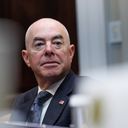TV weather storm brews over Allen Media's plans to centralize weather operations
A move by Allen Media Group to centralize weather operations at the Weather Channel, rather than keeping meteorologists at its local stations, has met with fierce resistance from viewers.
Why it matters: Local meteorologists know the communities they serve, and viewers tend to trust them over national sources. In severe weather situations, those factors can save lives.
- Many broadcasters also are trusted messengers on climate change.
Zoom in: Allen Media Group, owned by billionaire Byron Allen, owns both the Atlanta-based Weather Channel and a slew of local TV stations, mainly in smaller media markets.
- These range from KITV and KIKU in Honolulu to WCOV in Montgomery, Ala.
- The company announced a plan on Jan. 18 to use its state-of-the-art studios in Atlanta and move some of its local meteorologists there, while leaning on the Weather Channel's resources and personnel as well.
- The plan — set to play out during 2025 — also involves letting go of some local TV forecasters, prompting a wave of meteorologists to post online looking for new job opportunities and at least one to tell viewers goodbye during a newscast.
- Allen Media Group later appeared to reverse the decision, reportedly informing some local stations that their weather teams would remain in place for now.
The intrigue: In some of these TV markets, losing local meteorologists could create a TV weather desert in much the same way that losing newspapers nationwide has led to news deserts.
- Some in the TV weather industry fear that the Allen Media move represents a coming consolidation of local meteorologists to centralized weather hubs, given that just a few companies own a large number of local stations.
Friction point: Viewer reactions to the planned changes has illustrated the bond between local meteorologists and their viewers.
- WTVA in Tupelo, Miss., was among the stations where the weather was reportedly set to be outsourced to Atlanta, prompting viewers to organize a petition to save the meteorology team's jobs.
- Six state senators also drafted a resolution to urge Allen Media to reconsider layoffs.
- When an EF-3 tornado struck Amory, Miss., in March 2023, the forecast and warning from WTVA's Chief Meteorologist Matt Laubhan saved lives, Amory resident Jenny Hutson told Axios.
Hutson's home was severely damaged in the tornado, but her family took refuge in a community shelter thanks to Laubhan's guidance about exactly where the storm was headed.
- Laubhan also went viral during his forecast for that storm when he briefly prayed for the city live on television.
- "I just was just so thankful that he took the time to pray over people he doesn't personally know. …. That will always mean something to me," she said.
The other side: According to a person closely familiar with Allen Media's strategy, it stems from recognizing that extreme weather events are becoming more severe and frequent, largely because of climate change.
- As a result, how TV weather is presented needs to change, and the company's state-of-the-art weather production facilities in Atlanta offer significant advantages for their local stations to tap into, the person said.
- The Weather Channel's studios boast advanced immersive media production capabilities that can show viewers the effects of everything from storm surge flooding to an EF-5 tornado.
Allen Media intends to take the next year to implement its plan, with some of its local TV meteorologists already interviewing and being offered jobs in Atlanta.
- Others may stay at their stations, and some may lose their jobs.
State of play: Matt Chisolm, another WTVA viewer, told Axios he is concerned about the impact that outsourcing weather forecasts will have on an area that's notorious for tornadoes and severe weather.
- That's especially true, he said, when many residents don't have storm shelters in their homes and rely on advance warnings to have time to get to a community shelter.
- Chisholm, a self-proclaimed weather geek, said when forecasters use local landmarks, schools or churches to give you a storm's path, "it feels more real."
- "It's just the way people think, and they're going to be more apt to take heed of the warning," he said. Forecasters in Atlanta can't possibly know local landmarks and backroads in rural areas, he added.
The bottom line: Given climate change-related extreme weather trends, the push to broadcast local weathercasts from Atlanta strikes many as ill-suited to keeping people safe.
- It is also a warning sign of the future for TV meteorology.













